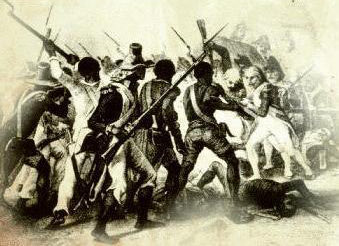
#OTD 14 September, 1812, Napoleon finally caught a glimpse of Moscow from the Sparrow Hills, with the Grande Armée ecstatically shouting “Moscou, Moscou!"
However, the conqueror grew increasingly distressed by the absence of any delegation from the city.
#Voicesfrom1812

However, the conqueror grew increasingly distressed by the absence of any delegation from the city.
#Voicesfrom1812


At 10 a.m., on top of the hill, Napoleon could see “500 golden and multicolored domes shimmering above a sea of rooftops.” At last he was in Moscow, where he expected to make peace with Alexander.
“There, at last, is that famous city! It was high time!” he said. (Brandt, Segur)
“There, at last, is that famous city! It was high time!” he said. (Brandt, Segur)

Rostopchin left the city at 11 a.m. He was nearly attacked by the mob enraged at being deserted by their own governor but saved himself by pointing at “two men, a Russian and a Frenchman” suspected of freemasonry, who were subsequently lynched. (Caulaincourt, Rostopchin, Segur) 



Fleeing with his son Sergei, Rostopchin wrote to his wife Catherine:
“Kutuzov deceived me when he said he would fight.. In fact, in my view everything is done for. Kutuzov is an obstinate old woman. Tomorrow he is going to move along the Vladimir Road without knowing why.”
“Kutuzov deceived me when he said he would fight.. In fact, in my view everything is done for. Kutuzov is an obstinate old woman. Tomorrow he is going to move along the Vladimir Road without knowing why.”
At 1 p.m., Murat discovered Miloradovich’s rearguard and followed it into the Dorogomolov Suburb. To Sebastiani, Miloradovich demanded a truce to allow for an orderly evacuation of the city lest he set it on fire. Murat conveyed this to Napoleon, who gave his assent. (Foord) 

As the Grande Armée neared the Dorogomolov Gate, all momentarily forgot about their excruciating sojourn and exulted in their achievement.
Segur mentioned how the visage of "this brilliant knot uniting Asia and Europe" incited "the acclimation of all nations."

Segur mentioned how the visage of "this brilliant knot uniting Asia and Europe" incited "the acclimation of all nations."


Sergeant Bourgogne of the Imperial Guard vividly described the moment he heard his men shouting, "Moscou! Moscou!"
He recounted how "[a]t the sight troubles, dangers, fatigues, privations were all forgotten, and the pleasure of entering Moscow absorbed all our minds."
He recounted how "[a]t the sight troubles, dangers, fatigues, privations were all forgotten, and the pleasure of entering Moscow absorbed all our minds."

"To take up good quarters for the winter, and too make conquests of another nature-such is the French soldier's character: from war to love, and from love to war!"
Such was Bourgoyne's daydream about a peaceful stay in Moscow.
Such was Bourgoyne's daydream about a peaceful stay in Moscow.

As the Guard prepared to enter the city in their parade uniforms, others booed:
"There is the Guard who have not fought once throughout the campaign! They are going to show off in Moscow. As for us riffraff, we shall not be even allowed to stick our nose inside!"(Lt. von Wedel)
"There is the Guard who have not fought once throughout the campaign! They are going to show off in Moscow. As for us riffraff, we shall not be even allowed to stick our nose inside!"(Lt. von Wedel)

But Napoleon soon grew anxious as he waited for the Russians to evacuate the city. He was expecting the parley to be followed by a customary deputation from the city.
Had he seen what was happening inside the walls, he would have regretted not having replaced Murat with Davout.
Had he seen what was happening inside the walls, he would have regretted not having replaced Murat with Davout.

Following mutual approval of the armistice, the Polish 1st Hussars squadron had the honor of first entering the Dorogomolov Gate.
For next two hours, Moscow would stage a “curious spectacle of friends and enemies mingling higgledy-piggledy.” (Löwenstern)
For next two hours, Moscow would stage a “curious spectacle of friends and enemies mingling higgledy-piggledy.” (Löwenstern)

Captain Stanisław Szumski, a Polish adjutant, translated Murat's words to a Cossack: "Fine, at two sharp we shall enter the city. But do you have a watch?"
The King of Naples was generous enough to take his aides' and hand it to the Cossack, "who kissed his hand and went off."

The King of Naples was generous enough to take his aides' and hand it to the Cossack, "who kissed his hand and went off."


By waiting for Miloradovich for two hours, Murat and Napoleon allowed all able-bodied soldiers of the enemy rearguard to slip away toward Ryazan. Moreover, the bargain was essentially flawed, for Miloradovich had neither intention nor capability to preempt the upcoming disaster. 

At 4 p.m., Napoleon appointed Mortier as the Governor of Moscow and Durosnel as the Military Commandant, with a mission to bring the 'boyars' who would offer the conqueror the key to the city.
"Perhaps these inhabitants do not even know how to surrender," he grumbled. (Segur)
"Perhaps these inhabitants do not even know how to surrender," he grumbled. (Segur)

When it was becoming dark, all who had been sent along, including Daru, General Sołtyk, and Captain Brandt, came back with the most unfathomable news:
"Moscow deserted!"(Segur)
None but "a few wretches of the lowest class" and few foreigners remained at Moscow. (Caulaincourt)
"Moscow deserted!"(Segur)
None but "a few wretches of the lowest class" and few foreigners remained at Moscow. (Caulaincourt)

Napoleon, bivouacking at the same spot, asked Caulaincourt, "It is not possible..what do you think?" "Your Majesty knows very well what I think," replied he, who had staunchly opposed his war.
More disasters were awaiting them. At 11 p.m., the Moscow Bazaar was on fire. (Caul.)
More disasters were awaiting them. At 11 p.m., the Moscow Bazaar was on fire. (Caul.)

@threadreaderapp Unroll, Moscow is burning.
• • •
Missing some Tweet in this thread? You can try to
force a refresh























